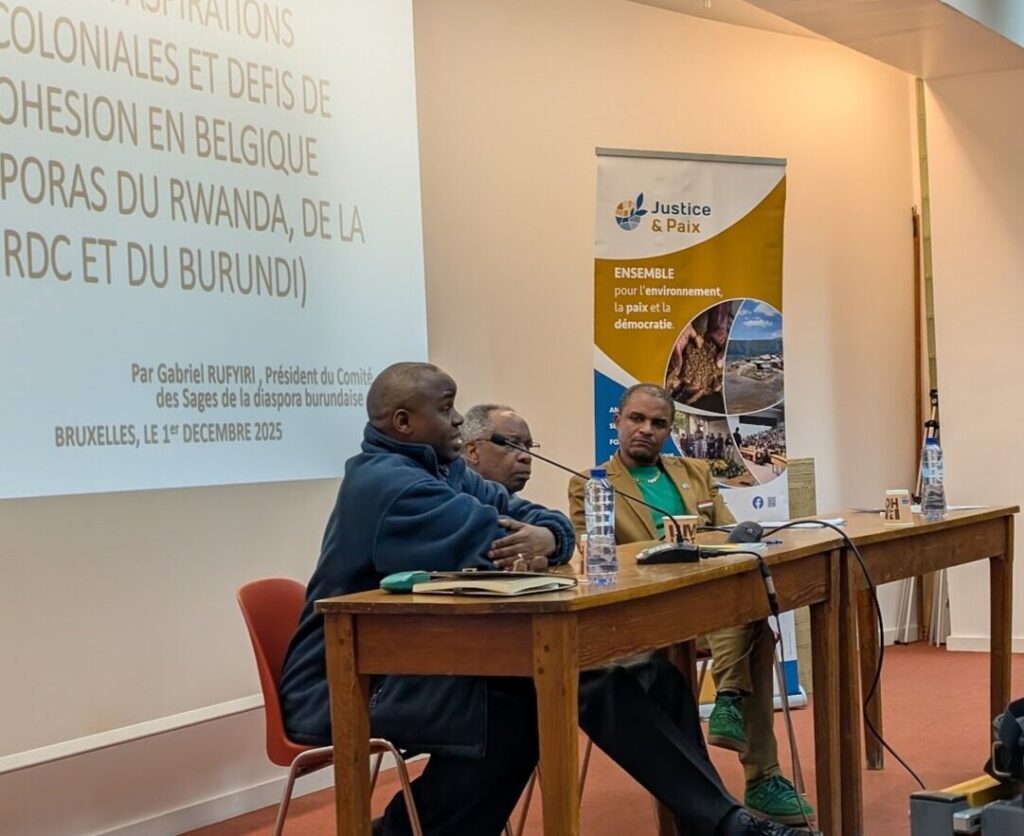
The confinement has highlighted the deep inequalities and limits of our economic system and has precipitated an awareness among citizens. The slowing down of the pace of our lives has given us time to think… about the life we lead and that of future generations. In this context conducive to reflection and renewal, ecofeminism offers us a reading grid to understand the different crises affecting our society and our planet.
The period we are facing today, the management and consequences of the pandemic, have given rise to a distrust of the systems in place, both political and economic. However, this distrust is accompanied by a multitude of actions and alternatives put in place directly by citizens. Ecofeminism allows us to better understand the emergence of these solidarity actions driven by the need to help fellow human beings, loved ones, colleagues, neighbors. By diving into the waters of ecofeminism, we open ourselves to a critique of contemporary society and to the alternative of a society based on other values.
Originally, ecofeminism is a term coined by Françoise d'Eaubonne [1]Catherine Larrère, “Ecofeminism: ecological feminism, feminist ecology”, Tracés, 22/2012, p. 105. , a French activist, novelist and philosopher. It was at the beginning of the 1970s, in the very particular context of the Cold War and deterrence through nuclear weapons, that she created an ecofeminist theory which was interested in the interconnection between ecology and feminism. . The fear of seeing a catastrophe arrive is omnipresent, the consequences seem surreal: the elimination of life on part of the Earth. The concern is very present and is leading to numerous citizen actions. From the beginning of the 1980s, numerous actions were an extension of Françoise d'Eaubonne's theory, ecofeminism. These will include, in particular, mobilizations organized by women fighting against nuclear development which endangers the planet, their lives and that of their children.
We can cite :
- the demonstration of “Plogoff” [2]Vincent Porhel, “Gender, environment and conflict in Plogoff (1980)”, Genre & Histoire, 2019. in France which will make it possible to stop the establishment of a nuclear power plant in the place of the same name at the request of François Mitterrand following the mobilization,
- the women's peace camp which peacefully fought against the installation of nuclear missiles on the Greenham Common military base, England [3]Suzanne Moore, Homa Khaleeli, Moya Sarner, Leah Harper, Justin McCurry, Interview: “How the Greenham Common protest changed lives”. The Guardian, 2017. or,
- the famous Women Pentagon Action in the United States where women formed a human chain encircling the Pentagon which represents the imperial power which “plays” with their lives. They thus proclaim their despair and their disagreement with the relaunch of military programs and the manufacturing of nuclear bombs. [4]Women and life on earth, “The Women Pentagon Action”. under the Reagan legislature.
Complex to define, ecofeminism is not the simple contraction of the terms ecology and feminism. Ecofeminism is at the same time a political movement, an ethic, a philosophy or even an aesthetic [5]Pascale Vielle, Alain Henry, “Ecofeminism, a perspective for thinking about the crisis of our ecosystem? », Societies in Change, number 9/May 2020, p. 3.. This is why there are many interpretations of the term “ecofeminism” which are all possible ramifications and perceptions of the world. Nevertheless, these perceptions come together and all agree around one observation: the existence of inseparable links in the relationships of domination exercised over women and nature. [6]Victoire Tuaillon, podcast: “The patriarchy against the planet”, The balls on the table, number 64/2020.. This observation is essential in ecofeminist reflection. With first of all a reflection on the domination of men over women, characteristic of patriarchy, on which the foundations of our Western society are based. And furthermore the domination of human beings over nature, which is maintained thanks to the productivist capitalist system which intensively exploits natural resources. To this can also be added the domination of the countries of the North over the countries of the South, through colonization and globalization.
It is not just a matter of criticizing the foundations on which our society was founded and the excesses that followed. It is about perceiving the interdependence between the evils we face. Consider the interdependence between symptoms to advise the root cause.
The capitalist economy claims to be self-sufficient. However, it reveals a double dependence, firstly, on the environment, which provides the raw material for most human needs. Secondly, with regard to women's labor force at the domestic level without which economic and market activities could not exist [7]Catherine Larrère, “Ecofeminism: ecological feminism, feminist ecology”, Tracés, 22/2012, p. 107.. This labor force is not salaried just as ecological costs are not taken into account in the production of capital. The empowerment of the economy, which we associate with modernity, and which globalization has extended to the entire planet, is based on the separation between domestic life and economic life. But also on the capacity of the economy to produce its own conditions of reproduction, by detaching itself from its associated environment, namely, its dependence on nature and the family. Women and nature are therefore absolutely necessary for the proper functioning of human and economic activity, but without being recognized as economic actors in their own right.
Women are the first victims of the mismanagement of natural resources, just like nature and natural resources, they are economic externalities. That's to say ? Female workers are underpaid, or not paid when it comes to taking care of the home. However, this activity is essential because it is responsible for the education of children and “care” functions. [8]“Care” is an English term and translates as “care, attention, concern”., necessary for the reproduction of labor power. Part of women's daily work is therefore made invisible by the current economic system. The economic system exploits them without compensation [9]Anne-Line Gandon, “Ecofeminism: feminist thinking about nature and society”, Feminist Research, number 1/2009, p. 13.. The capitalist system gives “the illusion of an autonomous economy, capable of self-regulating and generating added value, functions by concealing the female labor force and natural resources exploited for free” [10]Estelle Vanwambeke, “What ecofeminism tells us about the ecological crisis”, Oxfam, p. 2..
The notion of “care” refers to so-called “reproductive” work, which includes the domestic, care, attention and education activities that women generally and predominantly carry out. These are activities provided free of charge within homes but also the many professions which proved essential during confinement, caregivers, nurses, salespeople, as well as other activities providers of preserving the functioning of society. Women are predominantly represented in these professions, particularly in human health and social action where there are 80% women [11]Jehanne Bergé, “Ecofeminism and the revaluation of care to change the world”, RTBF.be, 2020.. The experience of confinement made us rediscover the importance of solidarity, attention to others and the protection owed to each person, we are all dependent on others and our environment whether for vital needs or more ordinary needs. [12]Nathalie Blanc, Sandra Laugier, Pascale Molinier, “ The price of the invisible. Women in the pandemic.”, The life of ideas, 2020.. The ecofeminist approach therefore tends to place “care”, this notion of care and attention towards others and towards the environment, at the center of our political-economic system. This makes it possible to rethink relationships, on the one hand, between individuals and on the other hand, between individuals and nature, from a perspective of respect and interdependence.
This framework of thought is associated with a system of values, highlighting the values of solidarity and mutual aid in opposition to the values of competition and individualism. In March 2020, during the first wave of the coronavirus, the spontaneous creation of a solidarity network around the domestic making of masks was considered an ecofeminist approach putting “care” at the center of the system. “In a few days, they trained each other, relocated production lines, demonstrated the essential issue of care” [13]Jehanne Bergé, “Ecofeminism and the revaluation of care to change the world”, RTBF.be, 2020.. It should be noted that once again, this work was, for the most part, unpaid and carried out on a voluntary basis, motivated exclusively by the urgency of helping others.
Currently, our modern Western society is built on two major political-economic principles: capitalism and patriarchy. These two systems operate on relations of domination. Capitalism introduces a search for capital through accumulation, through intensive production at lower cost. This has disastrous consequences for the environment and the use of nature by industries and individuals, but it also creates profound inequalities in the distribution of wealth. The observation that 1% of the planetary population has more wealth than the remaining 99% prompts reflection on the functioning of our economic system [14]Deborah Hardoon, “An economy serving 99%”, Policy papers, Oxfam, 2017.. Since the 19th century, the political-economic paradigm of productivist capitalism has dominated and it guides decision-making through its indicators such as GDP and growth. This model suggests that "we are all equal before nature, that we are all free to exploit it to enrich ourselves like Robinson Crusoe on his island, while we must take into account gender bias, class and race » [15]Anne-Line Gandon, “Ecofeminism: feminist thinking about nature and society”, Feminist Research, number 1/2009..
Françoise D'Eaubonne invents the term “illimitism” [16]Pascale Vielle, Alain Henry, “Ecofeminism, a perspective for thinking about the crisis of our ecosystem? », Societies in Change, number 9/May 2020, p. 4. to designate this accumulation of capital and this search for unlimited growth. Already in 1974, with the Meadows report, the Club of Rome sounded the alarm about the impossibility of maintaining this “unlimitedness”. This political-economic model has led to a disconnection between the sensitive approach to reality and its modeled representation but also a denial of the interdependence of inputs to this system. Bruno Latour asks the question: “How can we accept that economic theories are objective, incapable of integrating into their calculations the scarcity of resources whose exhaustion they were nevertheless intended to predict? » [17]Ibid, p. 5. . According to ecofeminism, this domination of the capitalist system over nature is closely linked to the domination suffered by women within patriarchal society. According to Françoise d'Eaubonne, "the ideological matrix which allows the domination of men over women is the same as that which allows the domination of men over nature" [18]Anne-Line Gandon, “Ecofeminism: feminist thinking about nature and society”, Feminist Research, number 1/2009, p. 8. It is therefore a culturally constructed way of thinking that would lead to a set of behaviors of domination and oppression. So a question arises: How can we think beyond these systems that are anchored and deeply established in our societies and our minds?
Finally, “Ecofeminism is a reading grid which denounces the relationships of oppression of our nature/humanity, masculine/feminine, North/South, scientific/intuitive societies” [19]Jehanne Bergé, “Ecofeminism and the revaluation of care to change the world”, RTBF.be, 2020.. In the academic and scientific world, many are convinced of the urgency of changing the political-economic model but these recommendations have difficulty finding an echo within the political community. Challenging an established system is extremely complicated.
Ecofeminism tends to rethink the world through a new prism in which patriarchy and capitalism are not the norm. This approach offers us possible alternatives to the functioning of current society. Françoise d'Eaubonne imagined a society defeated by all struggles for power and rebuilt on new foundations. Within the framework of ecofeminist reflection, a point of view is never unique and the importance of the multiplicity of possibilities and interpretations is essential, this not being valued in current society which favors one system over all others. . In this regard, there would be no plea for feminine particularism but for a universalism of which each sex would be the bearer. [20]Anne-Line Gandon, “Ecofeminism: feminist thinking about nature and society”, Feminist Research, number 1/2009, p. 9.. If ecofeminism denounces relationships of domination over women and nature, it is not a framework for reflection reserved for women. The objective being to rehabilitate all the values currently conceived as "inferior", that is to say the emotional, the natural, the concrete, the particular, associated with the feminine, to place them in the same status as the so-called “superior” values, reason, culture, associated with the masculine. These associations being culturally constructed, this is not fixed.
Far from conceiving the individual as an isolated human being, ecofeminist thought understands him in his complex links of material dependence – and continuity – with the Earth, on the one hand, and with Others, on the other. [21]Pascale Vielle, Alain Henry, “Ecofeminism, a perspective for thinking about the crisis of our ecosystem? », Societies in Change, number 9/May 2020, p. 5.. The ecofeminist approach thus calls into question representations based on a hierarchical organization dominated by economic reason, and expressed by quantified indicators. These indicators give our infinitely dense and complex world a modeled and reductive representation [22]Pascale Vielle, Alain Henry, “Ecofeminism, a perspective for thinking about the crisis of our ecosystem? », Societies in Change, number 9/May 2020, p. 5..
Conceive our interdependence with others and nature as something concrete to take the necessary measures for cohabitation that does not lead to ecocide. Ultimately, it is not a question of adhering or not to a new system of thought but rather of questioning the model in place to open up space for alternatives. Alternatives that take into account the invisible costs and consequences of our way of operating. As citizens, we have the right to think differently and to envisage a less gloomy future but above all, our elected officials have a duty of action and conscience in the face of the limits of the current political-economic model as well as to act and to facilitate the emergence of alternatives, through the power of the law and regulations beyond the games of influence.
Mila Gatti.
Attachments
Notes[+]
| ↑1 | Catherine Larrère, “Ecofeminism: ecological feminism, feminist ecology”, Tracés, 22/2012, p. 105. |
|---|---|
| ↑2 | Vincent Porhel, “Gender, environment and conflict in Plogoff (1980)”, Genre & Histoire, 2019. |
| ↑3 | Suzanne Moore, Homa Khaleeli, Moya Sarner, Leah Harper, Justin McCurry, Interview: “How the Greenham Common protest changed lives”. The Guardian, 2017. |
| ↑4 | Women and life on earth, “The Women Pentagon Action”. |
| ↑5 | Pascale Vielle, Alain Henry, “Ecofeminism, a perspective for thinking about the crisis of our ecosystem? », Societies in Change, number 9/May 2020, p. 3. |
| ↑6 | Victoire Tuaillon, podcast: “The patriarchy against the planet”, The balls on the table, number 64/2020. |
| ↑7 | Catherine Larrère, “Ecofeminism: ecological feminism, feminist ecology”, Tracés, 22/2012, p. 107. |
| ↑8 | “Care” is an English term and translates as “care, attention, concern”. |
| ↑9 | Anne-Line Gandon, “Ecofeminism: feminist thinking about nature and society”, Feminist Research, number 1/2009, p. 13. |
| ↑10 | Estelle Vanwambeke, “What ecofeminism tells us about the ecological crisis”, Oxfam, p. 2. |
| ↑11 | Jehanne Bergé, “Ecofeminism and the revaluation of care to change the world”, RTBF.be, 2020. |
| ↑12 | Nathalie Blanc, Sandra Laugier, Pascale Molinier, “ The price of the invisible. Women in the pandemic.”, The life of ideas, 2020. |
| ↑13 | Jehanne Bergé, “Ecofeminism and the revaluation of care to change the world”, RTBF.be, 2020. |
| ↑14 | Deborah Hardoon, “An economy serving 99%”, Policy papers, Oxfam, 2017. |
| ↑15 | Anne-Line Gandon, “Ecofeminism: feminist thinking about nature and society”, Feminist Research, number 1/2009. |
| ↑16 | Pascale Vielle, Alain Henry, “Ecofeminism, a perspective for thinking about the crisis of our ecosystem? », Societies in Change, number 9/May 2020, p. 4. |
| ↑17 | Ibid, p. 5. |
| ↑18 | Anne-Line Gandon, “Ecofeminism: feminist thinking about nature and society”, Feminist Research, number 1/2009, p. 8. |
| ↑19 | Jehanne Bergé, “Ecofeminism and the revaluation of care to change the world”, RTBF.be, 2020. |
| ↑20 | Anne-Line Gandon, “Ecofeminism: feminist thinking about nature and society”, Feminist Research, number 1/2009, p. 9. |
| ↑21 | Pascale Vielle, Alain Henry, “Ecofeminism, a perspective for thinking about the crisis of our ecosystem? », Societies in Change, number 9/May 2020, p. 5. |
| ↑22 | Pascale Vielle, Alain Henry, “Ecofeminism, a perspective for thinking about the crisis of our ecosystem? », Societies in Change, number 9/May 2020, p. 5. |





